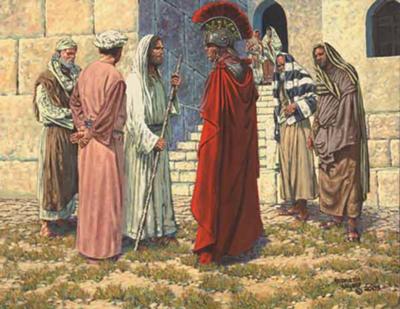Is John 4:46-53 the same story as the centurion and pais in Matthew 8 and Luke 7?
by René
(Switzerland)

Jesus and the Centurion
That's an intriguing question. There are similarities which on the surface, cause us to wonder if the Bible is describing the same account in Matthew 8:5-13, Luke 7:1-10 and John 4:46-53. I believe Matthew and Luke are talking about the same incident and John is talking about a different incident.
Notice the similarities and differences between the Matthew, Luke and John stories, especially the different Greek words used. I show the transliterated Greek words from Blue Letter Bible online.
1) The story occurs in Capernaum in all three accounts.
2) The story involves a Roman hekatontarches or centurion in Matthew and Luke and a basilikos or nobleman in John.
3) Jesus is asked to heal the hekatontarches/ centurion’s very ill pais/lover/servant in Matthew and Luke; in John a pater/father asks healing for his huios/son.
4) The pais/lover/servant is said to have paralytikos/palsy and is grievously tormented in Matthew, is sick and ready to die in Luke, while the huios/son in John is astheneo/sick.
5) Jesus says He will come to heal the sick pais/lover/servant in Matthew, starts toward the house in Luke and performs a long distance healing in Matthew, Luke and John, without entering the house in any of the stories.
6) The elders of the Jews intercede with Jesus for the hekatontarches or centurion but the pater or father in John does his own negotiating with Jesus and no elders are mentioned.
7) The pais/lover/servant in Matthew and Luke is healed and the huios/son in John is healed.
8) Jesus commends the faith of the hekatontarches or centurion in Matthew and Luke as the greatest faith He has seen but says nothing about the pater/father's faith in John.
Related Links
Is there a gay centurion in the Bible?
How does the Roman marriage ban factor into our discussion?
Who is Jesus?
Was the centurion really gay?
Is there any evidence of an actual gay marriage in the Bible?
Does becoming a Christian make you heterosexual?
Does the Bible say homosexuals will go to hell?
René's Original question:
"Restudying carefully the chapter of your book, Gay Christian 101, 'The Roman Centurion and his pais', where you analyze the respective Matthew and Luke pericopes (stories), a problem has arisen.
Many bibles give reference to John 4:46-53 as a parallel to these two accounts. Of course I do realize these references are not inspired, but there must be some scholarly reasoning behind it. Reading carefully the account of John, the greek nouns 'hjios', 'paidios' and 'pais' are used.
Considering and combining all of them, it is obvious that John is excluding every other meaning than 'son', which seems to conflict with your (in my opinion absolutely correct) rendering of 'pais' in Matthew and Luke as younger partner in a homosexual partnership.
I would appreciate your comment on why John 4:46-53 should not be taken into consideration as a parallel.
Thank your for your kind reply
René"



